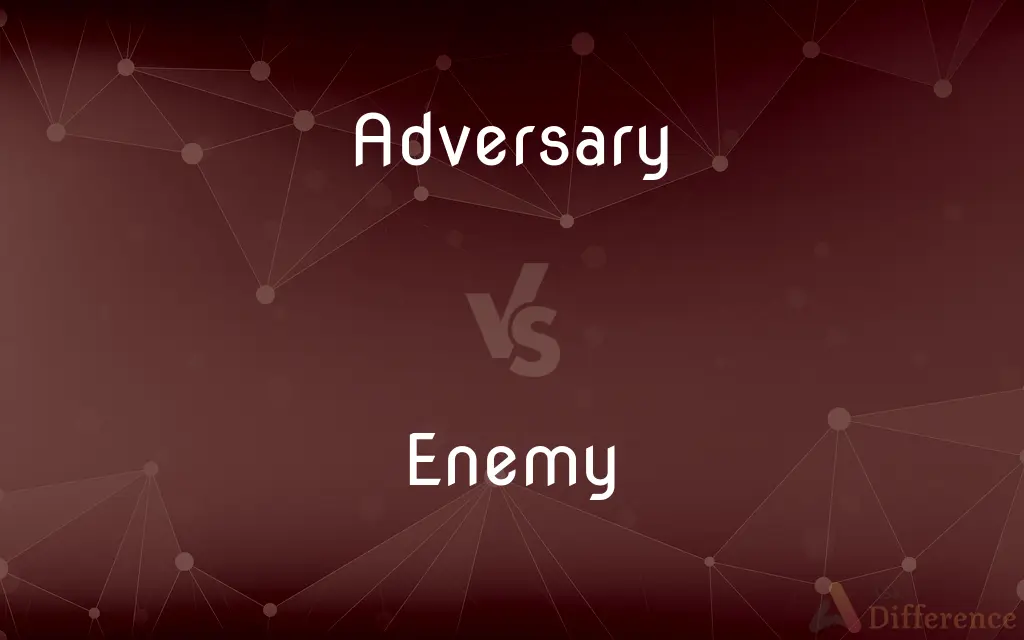Adversary vs. Enemy — What's the Difference?
By Tayyaba Rehman — Updated on September 14, 2023
An adversary is an opponent in a contest or dispute, while an enemy is someone who is actively hostile or opposes another.

Difference Between Adversary and Enemy
Table of Contents
ADVERTISEMENT
Key Differences
Adversaries often denote competition without a necessarily malicious intent. For example, in sports or a debate, participants consider each other adversaries. In contrast, an enemy implies a deeper animosity or hostility, often persisting outside the confines of a single contest.
Adversaries might be temporary, bound by the context of the competition. Once the contest ends, the adversarial relationship might dissolve. On the other hand, enemies often have longstanding grievances, with hostility enduring beyond specific incidents.
While "adversary" typically suggests a sense of respect for the opposing party, "enemy" can hint at underlying negative emotions like hate or anger. Lawyers representing opposite sides in court are adversaries, operating within professional boundaries. Conversely, countries at war view each other as enemies, highlighting the depth of their conflict.
It's essential to understand that while all enemies can be adversaries, not all adversaries are enemies. Two companies competing in the market are adversaries, challenging each other for market share. But if one company seeks to harm the other beyond healthy competition, they might be perceived as enemies.
Adversary emphasizes the opposing position more than the nature of the relationship. It's neutral, indicating opposition without malice. Meanwhile, enemy encapsulates a sense of threat or harm and indicates a more personal, often harmful intent towards the other party.
ADVERTISEMENT
Comparison Chart
Definition
An opponent in a contest or dispute.
Someone who is actively hostile or opposes.
Duration
Often temporary and context-specific.
Typically long-standing and persistent.
Emotional Undertone
Neutral, emphasizes opposition.
Negative, implies malice or harm.
Examples
Sports teams, debating parties.
Warring nations, personal foes.
Relationship Complexity
Can be respectful despite opposition.
Often entails deeper animosity.
Compare with Definitions
Adversary
It denotes someone in opposition.
The young senator became a notable adversary in the debates.
Enemy
Denotes hostility or antipathy.
The dragon was the knight's most formidable enemy.
Adversary
Represents an opposing force in a situation.
Nature can be humanity's greatest adversary.
Enemy
Represents a threat or danger.
Infections are the body's unseen enemy.
Adversary
Often context-specific opposition.
Though adversaries in the courtroom, they were friends outside.
Enemy
Carries a personal and negative undertone.
He turned his back on his former friend, now an enemy.
Adversary
One's opponent in a contest, conflict, or dispute
Davis beat his old adversary in the quarter-finals
Enemy
An enemy is one who harbors ill will.
He considered anyone undermining him an enemy.
Adversary
Another term for adversarial
The confrontations of adversary politics
Enemy
Often involves longstanding conflict.
The two families were sworn enemies for generations.
Adversary
An opponent; an enemy.
Enemy
An enemy or a foe is an individual or a group that is considered as forcefully adverse or threatening. The concept of an enemy has been observed to be "basic for both individuals and communities".
Adversary
Adversary The Devil; Satan. Often used with the.
Enemy
One who feels hatred toward, intends injury to, or opposes another; a foe.
Adversary
An opponent or rival.
He prepared to fight his adversary.
Enemy
One who opposes or is hostile to an idea or cause
An enemy of democracy.
Adversary
One who is turned against another or others with a design to oppose or resist them; a member of an opposing or hostile party; an opponent; an antagonist; an enemy; a foe.
His ancient knot of dangerous adversaries.
Agree with thine adversary quickly.
It may be thought that to vindicate the permanency of truth is to dispute without an adversary.
Enemy
Something destructive or injurious in its effects
"Art hath an enemy called Ignorance" (Ben Jonson).
Adversary
Opposed; opposite; adverse; antagonistic.
Enemy
A hostile power or force, such as a nation.
Adversary
Having an opposing party; not unopposed; as, an adversary suit.
Enemy
A member or unit of such a force.
Adversary
Someone who offers opposition
Enemy
A group of foes or hostile forces. See Usage Note at collective noun.
Adversary
An adversary is a competitor in a particular activity.
In the finals, she met her strongest adversary yet.
Enemy
Of, relating to, or being a hostile power or force.
Adversary
An adversary can be a rival.
The two tech giants became key adversaries in the market.
Enemy
Someone who is hostile to, feels hatred towards, opposes the interests of, or intends injury to someone else.
Under enemy duress
He made a lot of enemies after reducing the working hours in his department.
You may not want any enemies, but sometimes, your enemies choose you.
Enemy
A hostile force or nation; a fighting member of such a force or nation.
Rally together against a common enemy.
Enemy
Something harmful or threatening to another
Enemy
Of, by, relating to, or belonging to an enemy.
The building was destroyed by enemy bombing.
Enemy
(video games) A non-player character that tries to harm the player.
Enemy
To make an enemy of.
Enemy
One hostile to another; one who hates, and desires or attempts the injury of, another; a foe; an adversary; as, an enemy of or to a person; an enemy to truth, or to falsehood.
To all good he enemy was still.
I say unto you, Love your enemies.
It was difficult in such a country to track the enemy. It was impossible to drive him to bay.
Enemy
Hostile; inimical.
They . . . every day grow more enemy to God.
Enemy
An opposing military force;
The enemy attacked at dawn
Enemy
An armed adversary (especially a member of an opposing military force);
A soldier must be prepared to kill his enemies
Enemy
Any hostile group of people;
He viewed lawyers as the real enemy
Enemy
A personal enemy;
They had been political foes for years
Common Curiosities
Can an adversary be friendly?
Yes, adversaries can have a friendly rivalry without malicious intent.
Are all competitors adversaries?
In a broad sense, competitors are adversaries as they oppose each other, but the term's usage depends on context.
How is adversary different from antagonist?
While both imply opposition, antagonist often denotes a central opposing force, especially in narratives.
Can you have a personal adversary?
Yes, one can have a personal adversary in contexts like rivalries or disputes.
Are all adversaries enemies?
No, while all enemies can be adversaries, not all adversaries are enemies.
Does enemy always imply deep hatred?
While "enemy" often indicates hostility, the depth can vary by context.
Can one be their own adversary?
Yes, individuals can be their own adversaries when conflicted or self-sabotaging.
Is enemy always personal?
No, it can be impersonal like a nation's enemy or abstract like "time."
Can enemies reconcile?
Yes, enemies can reconcile and overcome their differences.
Is adversary a negative term?
Not necessarily, it mainly denotes opposition, which can be neutral or even respectful.
Can you have a common enemy?
Yes, multiple parties can share a common enemy.
Can businesses be adversaries?
Yes, businesses competing in the same market are often seen as adversaries.
Is enemy stronger than foe?
Both denote opposition, but "enemy" often implies deeper animosity than "foe."
How is enemy used in literature?
In literature, an enemy often represents a force opposing the protagonist, either as a character or a concept.
Are enemies always individuals?
No, entities like nations, organizations, or groups can also be enemies.
Share Your Discovery

Previous Comparison
Manage vs. Handle
Next Comparison
Maximin vs. MinimaxAuthor Spotlight
Written by
Tayyaba RehmanTayyaba Rehman is a distinguished writer, currently serving as a primary contributor to askdifference.com. As a researcher in semantics and etymology, Tayyaba's passion for the complexity of languages and their distinctions has found a perfect home on the platform. Tayyaba delves into the intricacies of language, distinguishing between commonly confused words and phrases, thereby providing clarity for readers worldwide.













































